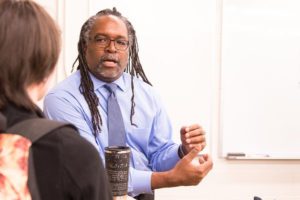
The first Juneteenth celebrations date back to 1866 in Texas, more than a year after the Civil War was officially declared over. But it wasn’t until 2021, when President Joe Biden signed the Juneteenth National Independence Day Act into law, that the day was recognized as a federal holiday.
Ray Black is an associate professor of ethnic studies focusing on African American studies, including representations of Black life in the slave narratives and other 19th century documents.
Ahead of the Monday holiday, Black spoke to SOURCE about the origins of Juneteenth and how people can celebrate it all year long.
SOURCE: Juneteenth is obviously not a new holiday, but it’s only been a federal holiday since 2021 and a state holiday here in Colorado since 2022, so some may still be unfamiliar with its origins. Tell me a bit about the origins and history of the holiday.
Ray Black: Juneteenth celebrates the day that the federal troops reached Galveston Texas in 1865, telling the enslaved people of the area that they were free.
The celebration has been in Texas for a long time, but there was a movement that began in the ’90s by a woman in Texas named Opal Lee to have it declared a federal holiday. The movement really began to pick up steam in Congress in 2016. Then the George Floyd murder and the worldwide Black Lives Matter protests brought the movement to make Juneteenth a federal holiday to prominence as one of the things that could be done to push forward racial healing or racial recognition. Part of the reason for holidays like Rev. Martin Luther King Jr. Day and Juneteenth is to bring awareness of the history of this country and its treatment towards African Americans, the Africans who were brought into slavery, Africans who immigrated to this country and were considered by the society to be Black, and today, with the George Floyd protests and the Black Lives Matter protests, which themselves are a continuation of Civil Rights protests over the centuries.
Why did it take so long to become a federal holiday?
Well, in the same way that Dr. King’s birthday took 15 years to become a holiday even with the many efforts of prominent individuals like Stevie Wonder and many politicians. It takes a while to get attention, and if you’ve been following the history of the United States in the last 10 years, there have been some controversial and divisive acts from political leadership in the United States.
Really the last push was the world-wide protests against police brutality and the murder of George Floyd, which were a continuation of the Black Lives Matter protests started 10 years ago with the murder of Trayvon Martin and many others.
Let’s remember, all of this happened during the pandemic’s height when we couldn’t go outdoors. Many people, including yours truly, went out with mask to protest what we saw even during quarantine. When people were supposed to be in lock down, these killings and murders still happened. So, with that and the pressure for every institution, including Colorado State University, the state of Colorado, the city of Fort Collins, to respond and have that emphasis on diversity, one of the ways to show that was through making Juneteenth a state and federal holiday.
How can communities celebrate Juneteenth?
Locally, Juneteenth is a three-day event in Fort Collins. Most major cities and even smaller communities are hosting Juneteenth events, as well. Go to them, learn about Juneteenth, engage with your community.
Juneteenth now has a national presence. While people may not understand the meaning or history of it, they recognize it as a holiday. We hope that it never gets to be the day that is used to sell cars or appliances but stays true to the role of a national holiday to bring national prominence to the event and — in the best of circumstances — to learn about its history.
I teach African American studies here at CSU, and the number of people don’t know about American history that involves African Americans is phenomenal. It is important to learn about why only 1% of Fort Collins is African American. It’s not an accident that the population here is so small. Black communities that were formed, successfully self-governed and thriving, were destroyed across the country. Thriving Black communities were removed through violence. The most prominent example is Tulsa, Oklahoma. But smaller examples can be seen in things like redlining, where the Federal Housing Administration after the Second World War granted home loans, especially to GIs and veterans but not in certain neighborhoods. They would draw a red line around where African Americans lived, formed by JIm Crow and legal segregation, had to rent and would not be able to buy homes in those neighborhoods, and thus would not be able to build wealth for their family or for their children’s children.
Also, most federal highways ran through Black neighborhoods. Central Park in New York is built on Seneca Village, a Black neighborhood that was displaced. Even housing projects like Cabrini Green went up in the South Side of Chicago, the city neglected the Black neighborhood it created. So, there is a way this country has specifically targeted African Americans and it is not an accident that majority Black neighborhoods are impoverished or treated unequally financially and in services. Part of what happened in Ferguson, Missouri, and the studies that came out of it from the federal government, is how this majority Black city was overpoliced and underserviced.
This is where we can do things to make change. In local politics, we can talk to our city councilors, and we have state senators and state representatives, and we can talk to (Rep.) Joe Neguse, we talk to Gov. (Jared) Polis; talk to our representatives, even on the school board, to make sure that this education is there, that when they come into my college African American history class they have some background. Those who do not go to college or take these classes need this history that Juneteenth presents.
About Ray Black
 Ray Black is a father, spouse, veteran and an associate professor in the Ethnic Studies Department at Colorado State University specializing in African American studies. His research focuses on college access, retention and graduation of African American and underrepresented populations. Black has taught early childhood education (Head Start), has been the coordinator for a non-profit program seeking to keep young men of color in high school, and led campaigns for reform minded school board candidates.
Ray Black is a father, spouse, veteran and an associate professor in the Ethnic Studies Department at Colorado State University specializing in African American studies. His research focuses on college access, retention and graduation of African American and underrepresented populations. Black has taught early childhood education (Head Start), has been the coordinator for a non-profit program seeking to keep young men of color in high school, and led campaigns for reform minded school board candidates.